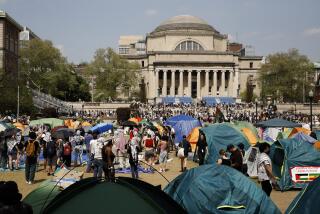China Works to Keep Lid on Protest : Unrest: Hundreds of paramilitary police are in evidence on the anniversary of the Tian An Men massacre.
BEIJING — Communist officials of Beijing University and at least one other Beijing-area campus held emergency meetings Monday seeking to avert further student unrest, Chinese sources said.
The meetings came as word spread among students in Beijing of a raucous anti-government protest Sunday night at Beijing University, in which hundreds of students threw bottles from windows, marched around campus and listened to speakers.
Hundreds of paramilitary police were stationed in Beijing’s main suburban campus district Monday, seeking to head off any more demonstrations marking the anniversary of the violent suppression of last year’s massive pro-democracy protests.
Just before midnight, Western reporters outside the Beijing University campus heard bottles breaking and students clapping. But as of 1 a.m. this morning, there had been no major incidents, and the campus seemed quiet.
Shortly before 2 a.m., a convoy including 17 open-backed trucks, each carrying about 40 paramilitary police, plus six military jeeps, three vans and a bus, was seen leaving the campus district. But several small groups of riot police equipped with shields and face masks, some on foot and others on three-wheeled, side-car motorcycles, remained in the area.
Late-night checkpoints operated by plainclothes and armed security officers were set up at many intersections. Journalists who tried to drive to the Beijing University area Monday evening were stopped at checkpoints and turned back, the Associated Press reported.
Witnesses said soldiers beat two African students from Burundi with truncheons near a gate of the walled campus and threatened other onlookers and reporters with their AK-47 assault rifles.
Tian An Men Square, the focus of last spring’s demonstrations for greater freedom, was closed for the fourth day and police on guard there kept pedestrians out of its north plaza and away from the Monument to the People’s Heroes, the obelisk that became the headquarters of the student demonstrators last June.
Witnesses at the square said police quickly pounced on four young women who lit candles beneath the huge portrait of Mao Tse-tung, Communist China’s founder, that overlooks the north end of the square. They put out one of the candles with a kick and blew out another, dispersing a gathering crowd of onlookers and detaining several foreigners briefly.
Foreign reporters also saw police arrest at least three Chinese there.
Despite the heavy security measures, there was some feeling at Beijing University on Monday of having won at least a small triumph.
“We would have really let down the ones who died last year if we hadn’t done anything to commemorate June 4 and the demonstrations before it,” a Beijing University student explained Monday.
Hundreds, perhaps thousands, of Beijing residents and students were killed last June when army troops shot their way into Beijing to end the protests.
“All the way from the Qing Ming Festival”--in early April, when Chinese traditionally mourn their dead--”to now, we haven’t done anything to commemorate last year,” he said. “We just got together last night, and decided we had to do something to commemorate the students who died last year.”
This student said he believes that the Beijing University protest developed spontaneously, partly because many students had been drinking heavily. The alcohol, he said, let their feelings out.
“We originally didn’t think about planning any activity,” he said. “But after getting together with close friends in our rooms, we didn’t want to stay in our rooms any more, and we started talking with other groups of friends in other rooms. And that’s how it came about . . . We were very satisfied with last night’s activity.”
The main speaker at Sunday night’s protest, identified by the Associated Press as 21-year-old economics major Li Minqi, disappeared Monday. Although initially word circulated on campus that he had been detained, many students believe that he slipped into hiding.
A Beijing University student quoted by the British news agency Reuters on Monday declared that “this government has tried to make us afraid to say anything.”
“They wanted to make us so that we can no longer tell the difference between truth and lies,” he said. “But last night showed that we still know the difference, and we are not afraid.”
Students at two other Beijing area campuses also staged bottle-throwing protests Sunday night, United Press International reported.
The Chinese phrase for “little bottle”-- xiaoping-- sounds very similar to senior leader Deng Xiaoping’s given name. Breaking bottles has become a widely recognized form of political protest.
Students at Qinghua University, one of China’s most prestigious schools of science and technology, threw bottles at a procession of police on motorcycles, hitting one officer, according to witnesses quoted by UPI on Monday.
At People’s University, students tossed bottles from their dormitory windows along with pieces of white paper twisted to look like flowers. White flowers and white clothes are symbols of mourning in China.
At the University of Science and Technology, which experienced no unrest Sunday, one student commented Monday, with some wonderment, that teachers had been required to make dormitory bed checks the previous night.
“I think it’s very silly,” the student said. “What are they afraid of? Everything is so calm now.”
Along with the sense of triumph felt by many, however, also came some foreboding.
A Beijing University student noted that the famous school, a traditional bastion of free thinking that is the most prestigious educational institution in all of China, now finds itself in a state of virtually perpetual confrontation with the government.
“Our school is really going to have some bad times for the next few years,” he said.
Times researcher Nick Driver also contributed to this article.
More to Read
Sign up for Essential California
The most important California stories and recommendations in your inbox every morning.
You may occasionally receive promotional content from the Los Angeles Times.










